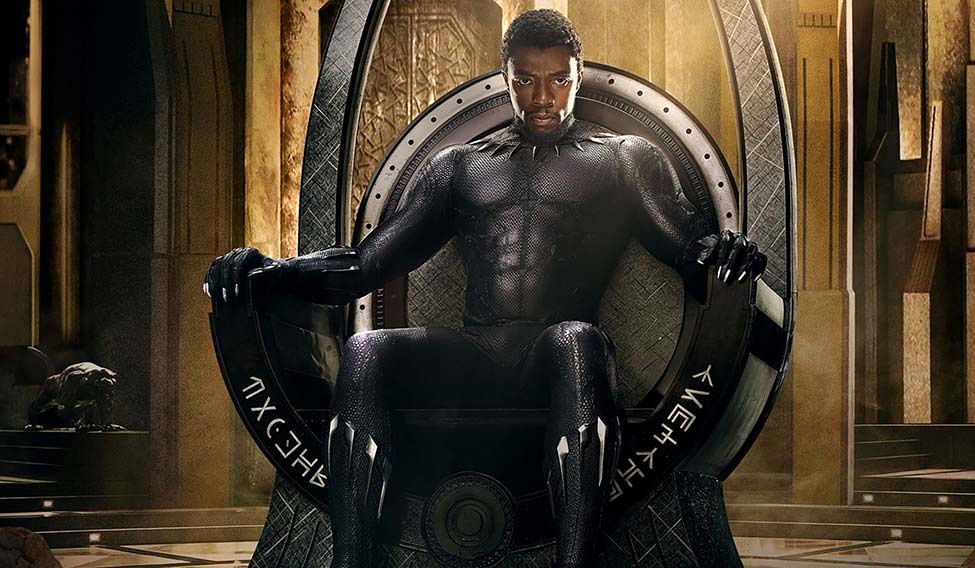As expected, Black Panther is a film with a message. It is not often you hear of a superhero flick—particularly one in the mammoth Marvel Cinematic Universe—that seeks to break barriers, and it does so spectacularly. It is a socially relevant, thoroughly entertaining take on a much-awaited origin story.
The film gives a powerful new spin to the MCU, and, in the process, successfully dismisses several grievances raised against the umbrella franchise.
For one, the cast and the makers of this film are predominantly coloured, and it tells an incredible story of the rise of black power. That is what makes the film revolutionary. Never before has such a commercially potent film been made with the presence of a large number of black actors.
The film subtly discusses the ostracism and centuries of pain suffered by African and African-origin people around the world. And, it shows how the emergence of these people from the fringes can change the world and make for an inspiring tale.
Second, its utilisation of plenty of strong women characters is a game changer. The lead character is surrounded by highly intelligent, powerful, warrior-like African women who play influential roles in the course of the narrative.
Third, and my personal favourite, is that the overbearing influence of the MCU, a common factor in every individual hero story, is almost non-existent. The producers have given the director and his team complete independence, and there are almost no Easter eggs that are privy to Marvel fans.
Of course, the wider Avengers narrative still lingers, and for good reason, but for the uninitiated, this film displays a fresh perspective on a little-known superhero.
The 'Black Panther' in this film is T'Challa (Chadwick Boseman), the prince-turned-king of Wakanda, a fictional east African country. The isolated country is the most richest and technologically advanced state in the world, because of its exclusive access to vibranium, the strongest metal in the world.
Vibranium is the focal point of this film. As it turns out, the metal is not only used to make Captain America's shield, but it is also a substance that gives the Panther his superhuman strength; its energy powers his suit.
To prevent the precious metal from falling into the wrong hands, the kingdom of five tribes keeps its true, prosperous side hidden from the outside world (fuelling belief that it is a third-world country), fearing it will destroy the country's peace.
It is a story we have been waiting to hear since Captain America: Civil War gave us a glimpse of a hero who was driven by grief. Following the death of his father (in Civil War), this film starts with him taking over the throne, and is immediately faced with challenges.
There is a challenger to the throne, N'Jadaka (Michael B. Jordan), who is T'Challa's long-lost cousin. Also called Killmonger, N'Jadaka is an African-American ex-U.S. black ops soldier, who wants to use Wakandan resources to bring stability to the world, by ruling it.
The film has a fairly simple tale to tell and it does it with a lot of style. The representation of African tribal communities, clothing, language and music introduces audiences to a whole new level of superlative African aesthetics.
The beautiful meeting of African culture with that of the iconic hip-hop black American one is a treat, particularly in the background scores and rapper Kendrick Lamar's songs.
The depiction of this utopian African nation doesn't disappoint either. It represents the latent wealth of the African continent, and successfully steers clear of the poverty that Africa is linked with in most movies.
The MCU may be overflowing with actors and A-listers, but adding Boseman to that should not be a problem. He delivers a masterful, emotionally charged performance in the lead role, while Lupita Nyong'o plays the strong-headed warrior, Nakia, with relative ease. Letitia Wright as T'Challa sister, Shuri, is the brain behind the Wakandan technology, and, is in all probability, more intelligent than Tony Stark.
Director Ryan Coogler had collaborated with Jordan in his successful Rocky spin-off, Creed, which was also a movie depicting black resurgence. Jordan brings tons of swagger to the movie, but his acting, unfortunately, doesn't reflect that of a vengeful person challenging for the throne.
Andy Serkis and Martin Freeman, the only two prominent white actors, are brilliant in their roles.
Another departure from the norm is the doing away with of the juggling between action and slapstick humour that has become a recurring theme in the MCU, and was overused in Thor: Ragnarok. There are few doses of humour delicately sewn into the movie, but none feel unnecessary. This movie gives a beautiful character sketch of the Wakandan king, who will be a key member of the team in Avengers: Infinity War (April 27).
Black Panther is thus a new milestone in this cinematic universe. The colonisation topic is a strong presence in the film, and though it isn't the in-your-face rebellion kind of depiction, it drives home the message well, in a post-Obama world, where racism is on the rise again.
At one point, a character who suffers grave injuries says that he would prefer to be buried in the oceans than to be revived and locked up for his crimes. For, like his ancestors who often jumped ship when enslaved, he preferred death to bondage. That speaks a lot about the movie's theme.
Movie: Black Panther
Director: Ryan Coogler
Cast: Chadwick Boseman, Lupita Nyong'o, Michael B. Jordan, Letitia Wright, Martin Freeman
Rating: 4/5







